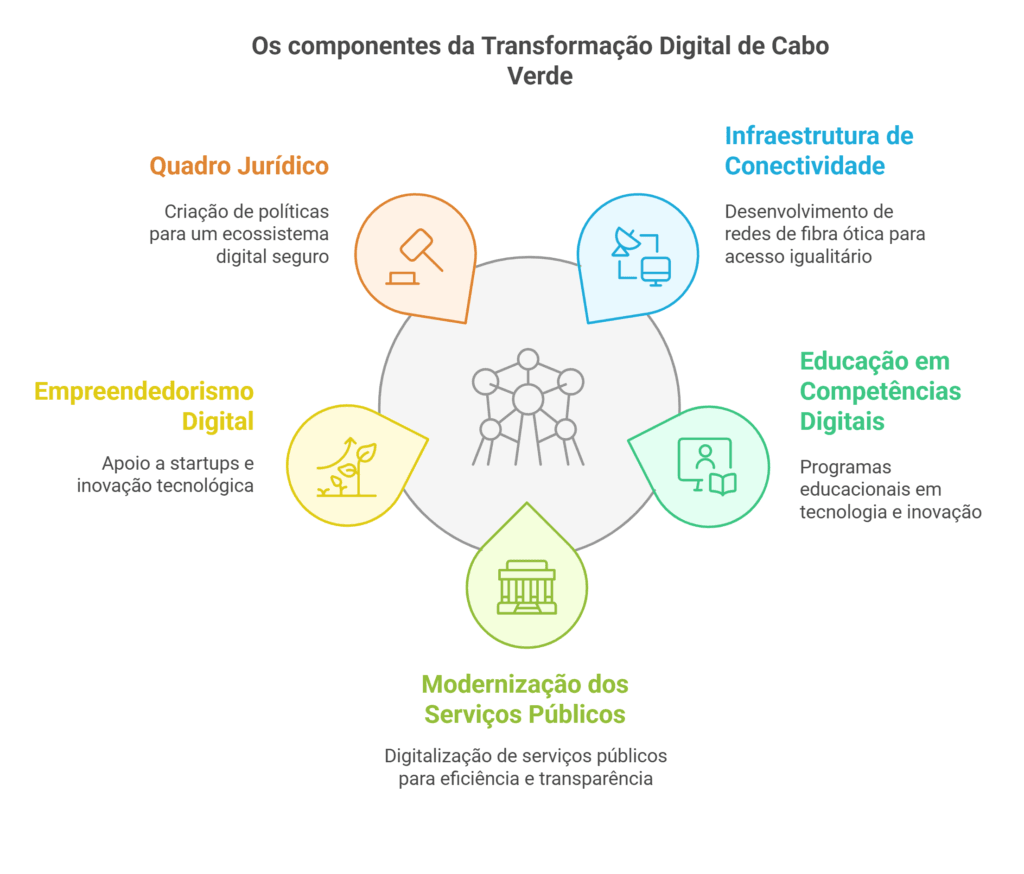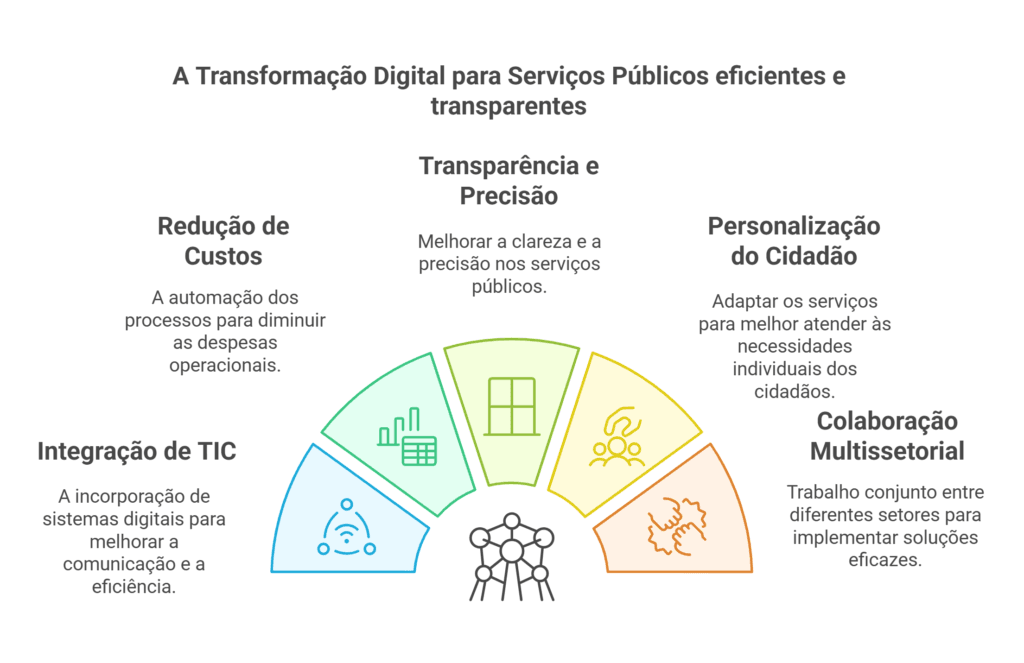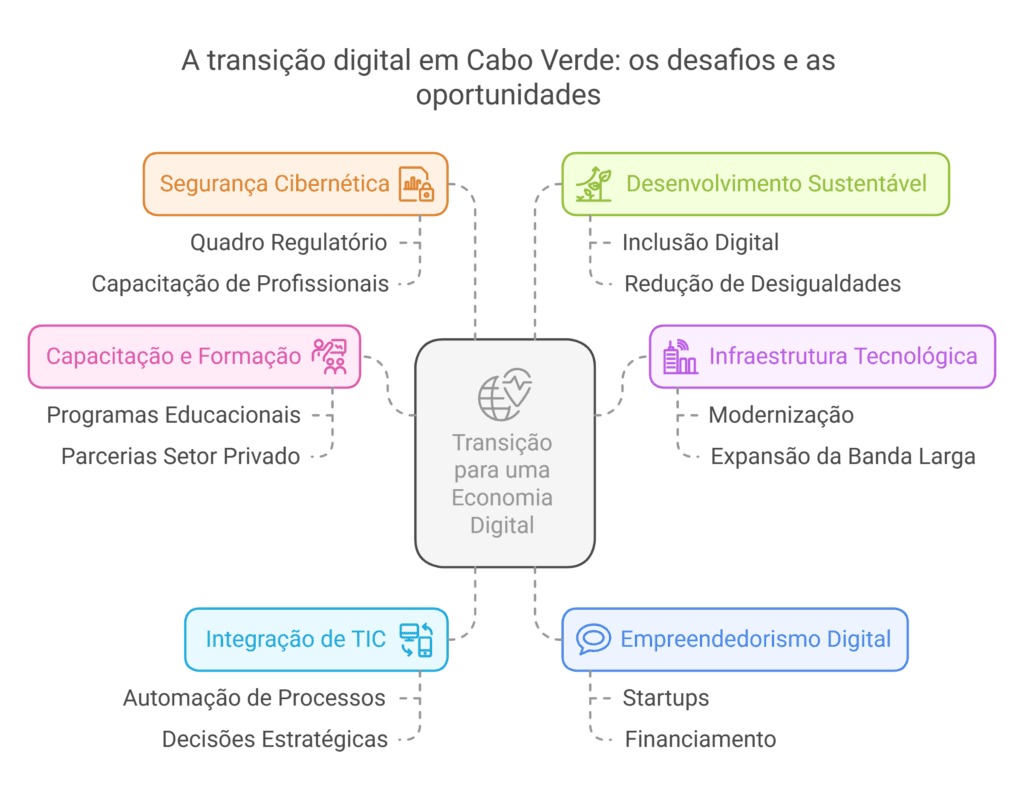

Digital transformation is a global phenomenon that is redefining the way organisations operate, and Cape Verde is no exception. The archipelago has been implementing robust strategies to position itself as a digital hub in West Africa, taking advantage of its privileged geographical location and political and social stability. This effort is an integral part of the "Strategic Plan for Sustainable Development - 2022/2026 (PEDS II)", which highlights the digital economy as a national priority (Macau Forum).
Process automation has emerged as an essential pillar in this transformation, allowing Cape Verdean organisations to leave behind manual and inefficient methods, such as the use of Word documents and Excel spreadsheets, in favour of more advanced and integrated digital solutions (ZURI). This move not only improves operational efficiency, but also increases the quality and delivery of services, a central focus for public and private organisations in the country.
Cape Verde is investing significantly in connectivity infrastructure and digital education programmes, such as "Weblabs", which has already enrolled thousands of students in emerging technological areas (World Bank). In addition, Cape Verde's Digital Governance Strategy (EGDCV 2023/2026) aims to digitise 60% of public services by 2026, with a target of 80% by 2030, reflecting the government's commitment to modernising public administration and making it more accessible and efficient for citizens (Balai).
This report explores Cape Verde's journey in process automation and digital transformation, analysing the strategies implemented, the challenges faced and the future opportunities to consolidate its role as a digital leader in the region.
Contents

The development of connectivity infrastructure is an essential pillar in Cape Verde's digital transformation strategy. The country has invested significantly in improving connectivity, with most services already connected by fibre optics. This investment aims to ensure that citizens can access public services efficiently and on equal terms, regardless of their geographical location (Balai).
In addition, the implementation of digital platforms, such as the Consular Portal, has proven successful in processing 62% of applications in one day and reducing the time it takes to issue electronic documents by 85% (World Bank). This type of infrastructure is crucial to the government's goal of digitising 60% of public services by 2026 and 80% by 2030.
Education and the development of digital skills are key to Cape Verde's digital transformation. The "Weblabs" programme is an example of success, having enrolled almost 14,000 students in areas such as web development, robotics and digital marketing (World Bank).
This investment in education aims to prepare the labour force for a digital future, promoting skills that are essential for economic growth and innovation. Continuous professional training and the creation of an innovation ecosystem are strategies aimed at strengthening national technology-based companies and making them more competitive at regional and global level (Ministry of Digital Economy).
Modernising public services through digitalisation is one of the main objectives of Cape Verde's digital transformation strategy. The Strategy for the Digital Governance of Cape Verde (EGDCV) 2021-2024 focuses on bringing the state closer to citizens and businesses, simplifying processes and improving the quality of public services (Government of Cape Verde).
The implementation of digital public services aims to reduce bureaucracy and facilitate access to information, promoting transparency and citizen participation. The interoperability of information systems is also a priority, enabling more effective integration of services and improving administrative efficiency (Balai).
Digital entrepreneurship is a vital component of Cape Verde's digital transformation strategy. The Cabo Verde Digital initiative promotes an innovation ecosystem that supports startups and small businesses, encouraging the development of innovative technological solutions (World Bank).
Programmes such as "Sikabadu" aim to attract investment from the diaspora in technology-based companies, strengthening the country's digital economy. This focus on digital entrepreneurship not only boosts the local economy, but also positions Cape Verde as a potential digital hub in West Africa (Ministry of Digital Economy).
The creation of a flexible legal and regulatory framework is essential for the success of the digital transformation in Cape Verde. This framework aims to facilitate the realisation and promotion of innovative activities, providing opportunities for market access and making companies more competitive at a national, regional and global level (Ministry of Digital Economy).
Strengthening the digital ecosystem through appropriate policies ensures that digital infrastructures and services are secure and resilient, promoting the confidence of citizens and businesses in the use of digital technologies. This regulatory approach is crucial for economic and environmental sustainability, as well as for social inclusion and reducing inequalities (Government of Cape Verde).

The integration of Information and Communication Technologies (ICT) is a fundamental pillar in the automation of processes in Cape Verde. The country has invested significantly in developing the ICT sector to modernise public services and facilitate access to information (World Bank). This investment aims to reduce bureaucratic barriers for citizens and businesses, while boosting the digital economy. The implementation of ICT allows for greater efficiency in the provision of public services, with the aim of digitising 60% of services by 2026 and more than 80% by 2030.
Process automation in the public sector not only improves operational efficiency, but also results in significant cost savings. Automated processes reduce operating costs, allowing resources to be allocated to priority areas (Liberty Group). This cost reduction is crucial for a country like Cape Verde, where financial resources are limited. Automation eliminates the need for labour-intensive manual processes, which results in significant savings and allows the government to redirect funds to development initiatives.
Process automation also promotes transparency and reduces subjectivity and the risk of human error. With the implementation of automated systems, processes become clearer and more reliable, which is essential for increasing citizens' trust in public services (Liberty Group). Transparency is particularly important in Cape Verde, where the asymmetry between the government, the opposition and society in terms of ethics and transparency in public administration has been a significant challenge (eScience).
Automation makes it possible to personalise services, which significantly improves customer service. The reduction in response times and the ability to personalise services according to citizens' individual needs increases public satisfaction with the services provided (Liberty Group). In Cape Verde, where the digital transformation aims to make public administration more agile and citizen-centred (Government of Cape Verde), personalising services is an essential step towards achieving this goal.
The automation of processes in the public sector has a direct impact on the population's quality of life, especially in critical areas such as health and social care. Faster and more efficient services result in tangible improvements in the lives of citizens, contributing to the general well-being of society (Liberty Group). In Cape Verde, digital transformation is seen as a means of promoting sustainable and equitable development, bringing benefits to all Cape Verdeans, both residents and in the diaspora (World Bank).
One of the most ambitious projects in Cape Verde is the development of a single portal for the provision of public services online. This portal, scheduled to be launched in January 2025, will gradually integrate all public administration services, centralising and simplifying access to public services (World Bank). This initiative aims to offer users a more efficient and integrated experience, significantly reducing the time and effort required to access government services.
The transition to automated services requires civil servants to be properly trained in digital literacy. In Cape Verde, continuous training is essential to ensure that consular staff and other public administration employees can operate effectively in a digitalised environment (World Bank). This training not only improves the efficiency of services, but also ensures that officials can guide and support citizens in using new digital systems.
The effective implementation of process automation in Cape Verde requires concerted collaboration between the government, the private sector, academia and civil society. This collaboration is key to ensuring that the benefits of digitalisation are shared by all and that Cape Verde establishes itself as a benchmark in digital governance and technological innovation in the region (Ministry of Digital Economy). Multi-sector co-operation is seen as a critical component for the success of the country's digital transformation.
Despite significant progress, Cape Verde faces challenges in implementing process automation, including infrastructure limitations and the need for greater digital inclusion. However, the opportunities for improving government efficiency and the quality of public services are vast. With a continued commitment to innovation and collaboration, Cape Verde is well positioned to become a robust and future-proof digital nation (Ministry of Digital Economy).

The transition to a digital economy in Cape Verde faces significant challenges in terms of human resource capacity building and training. The need for a skilled workforce in digital technologies is crucial to sustaining economic growth and technological innovation. The country has invested in educational programmes, such as the Weblabs programme, which has enrolled around 14,000 students in areas such as web development, robotics and digital marketing (World Bank). However, the gap between theoretical training and practical application remains an obstacle. The creation of partnerships between educational institutions and the private sector can help align the educational curriculum with the needs of the labour market.
Technological infrastructure is an essential pillar in the transition to a digital economy. Cape Verde has made progress in modernising its connectivity infrastructure, but still faces challenges related to coverage and quality of service. Cape Verde's Strategic Plan for Sustainable Development recognises the importance of digital infrastructure as a priority for the country's development (Island Express). The implementation of advanced communication technologies and the expansion of broadband are crucial to ensuring that all citizens have equal access to digital opportunities.
Although ICT integration has already been addressed in the context of process automation to improve public services, here we focus on its wider application in the digital economy. The use of ICT can transform traditional sectors such as agriculture and tourism, increasing efficiency and competitiveness. Digitising processes and using data to inform strategic decisions are opportunities that Cape Verde can exploit to boost economic growth and innovation (Balai.cv).
Digital entrepreneurship is a vital component in the transition to a digital economy. Initiatives such as Cabo Verde Digital have promoted an innovation ecosystem that supports startups and small businesses (World Bank). However, entrepreneurs face challenges such as access to finance and the lack of a favourable regulatory environment. Programmes such as "Sikabadu" aim to attract investment from the diaspora in technology-based businesses, but more government support is needed to facilitate access to resources and markets.
With the rise of digitalisation, cyber security and data protection have become critical concerns. Creating a robust regulatory framework to protect sensitive information and guarantee citizens' privacy is essential to building trust in the use of digital technologies. Cape Verde should adopt international cyber security standards and invest in training specialised professionals to mitigate risks associated with cyber attacks and data breaches (Ministry of Finance).
The transition to a digital economy must be inclusive and sustainable, ensuring that all segments of society have access to digital opportunities. The Cape Verdean government has been promoting digital inclusion through initiatives aimed at reducing inequalities in access to technology and empowering marginalised communities (Ministry of Digital Economy). Digitalisation can play a crucial role in promoting sustainable development, improving resource efficiency and reducing the environmental impact of economic activities.
International collaboration and strategic partnerships are key to the successful transition to a digital economy. Cape Verde has benefited from support from international organisations, such as the World Bank, to finance projects to digitise and modernise public services (World Bank). Establishing partnerships with countries and companies that are leaders in technology can speed up the transfer of knowledge and the implementation of innovative solutions.
Regulatory and political challenges represent significant obstacles in the transition to a digital economy. Creating a flexible and adaptable regulatory environment is essential to fostering innovation and attracting investment. Cape Verde must continue to develop policies that encourage competition and promote transparency, ensuring that digital infrastructures and services are secure and resilient (Government of Cape Verde).
Although Cape Verde has made remarkable progress in the transition to a digital economy, there are still significant challenges to overcome. Training human resources, improving technological infrastructure and creating a favourable regulatory environment are critical areas that require continued attention. With a renewed commitment to innovation and collaboration, Cape Verde is well positioned to become a digital leader in the West African region.
The digital transformation in Cape Verde is being driven by a comprehensive strategy covering the development of connectivity infrastructure, digital education and skills, modernisation of public services, digital entrepreneurship and a flexible legal framework. Investment in connectivity infrastructure, such as the expansion of fibre optics, has been crucial to ensuring equitable access to public services, while initiatives such as the Consular Portal demonstrate the potential of digitalisation to improve administrative efficiency (World Bank). Training in digital skills, through programmes such as "Weblabs", is preparing the workforce for a digital future, promoting innovation and the competitiveness of Cape Verdean companies (Ministry of Digital Economy).
Process automation in the public sector has proven to be a powerful tool for reducing operating costs, increasing transparency and improving the quality of services provided to citizens. The implementation of ICT and the creation of single portals for public services are significant steps towards achieving the goal of digitising 80% of public services by 2030 (Liberty Group). However, Cape Verde faces challenges such as the need for greater digital inclusion and the continuous training of human resources. Multisectoral collaboration and international partnerships are essential to overcome these barriers and ensure that the digital transformation contributes to the country's sustainable and equitable development (Ministry of Digital Economy).
To consolidate the progress made, it is crucial that Cape Verde continues to invest in technological infrastructure and human resources training, while developing a regulatory environment that promotes innovation and cyber security. Creating strategic partnerships with global technology leaders can accelerate the transfer of knowledge and the implementation of innovative solutions. With a continued commitment to innovation and collaboration, Cape Verde is well positioned to assert itself as a digital leader in West Africa, promoting an inclusive and resilient digital economy (World Bank).







